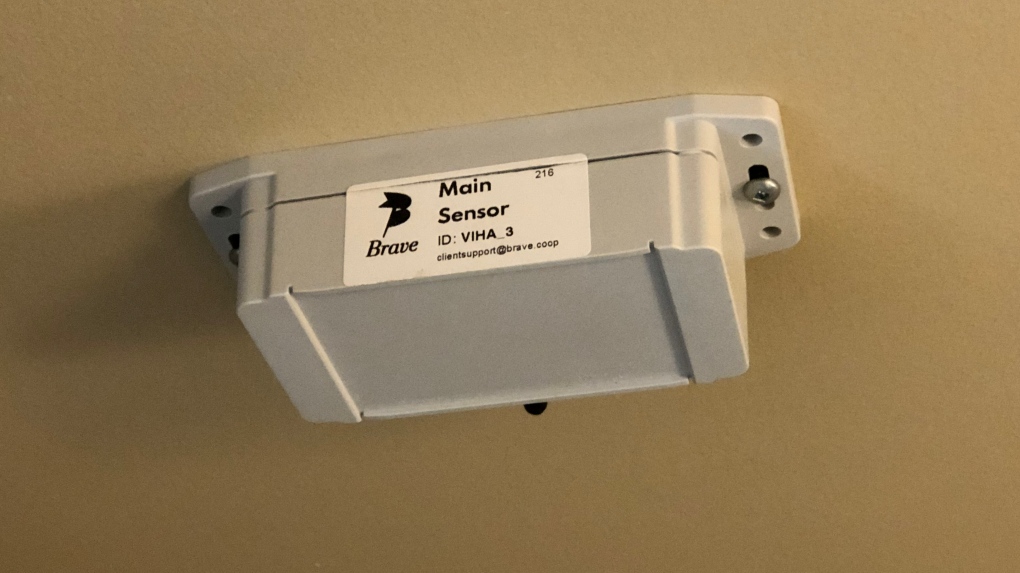'Life-saving' drug overdose detection sensors coming to Nanaimo hospital washrooms
A hospital in Nanaimo is preparing to introduce washroom motion-detection devices that health authorities say can save a life in the event of a drug overdose.
The Nanaimo Regional General Hospital will introduce the motion sensors this month following similar pilot projects at two mental health and substance-use sites in Courtenay.
Island Health credits the Courtenay trials with likely saving at least one life after a health-care worker was alerted by the sensor system to an unresponsive restroom occupant.
The system can be calibrated to send a text notification to a health worker’s phone if, for example, a washroom user hasn't moved for 60 seconds, or has been in the washroom for several minutes.
The health authority said Wednesday the technology is already "transforming washrooms into spaces that help save lives."
British Columbia recorded more than 2,200 deaths from illicit drug toxicity last year, with 386 of those occurring in the Vancouver Island region.
'TURNING A RESTROOM INTO A LIFE-SAVING SERVICE'
The Nanaimo trial will run for a minimum of three months with the technology provided by Vancouver-based Brave Technology Co-op.
"We know that the shame and stigma of addictions have driven people to use alone – but given the increasingly toxic drug supply, using alone can be fatal," Jennifer Whiteside, B.C.'s Minister of Mental Health and Addictions, said in a statement Wednesday.
 The Nanaimo Regional General Hospital will introduce the motion sensors this month following similar pilot projects at two mental health and substance-use sites in Courtenay. (Island Health)
The Nanaimo Regional General Hospital will introduce the motion sensors this month following similar pilot projects at two mental health and substance-use sites in Courtenay. (Island Health)
"Our government is working to break down the shame and stigma of addictions as we continue to expand and evolve our response to the toxic drug crisis. These trials by Island Health are another action to save lives and better support staff," the minister added.
Island Health board chairperson Leah Collins said the trial marks one of the first projects to be undertaken under the health authority's new innovation program that seeks out-of-the-box solutions to regional health-care issues.
"The value of this trial is that we’re turning a restroom into a life-saving service," Collins said.
CTVNews.ca Top Stories

London Ont. Liberal MPs say that Trudeau is taking time to reflect on his future
Both of London’s Liberal MPs are choosing their words carefully when it comes to their party's leadership future. They were asked about the situation in Ottawa at Friday's housing announcement in London.
New rules clarify when travellers are compensated for flight disruptions
The federal government is proposing new rules surrounding airlines' obligations to travellers whose flights are disrupted, even when delays or cancellations are caused by an "exceptional circumstance" outside of carriers' control.
Trudeau's 2024: Did the PM become less popular this year?
Justin Trudeau’s numbers have been relatively steady this calendar year, but they've also been at their worst, according to tracking data from CTV News pollster Nik Nanos.
10 people including children die in stampede in Nigeria at a Christmas charity event
Ten people, including four children, were killed in a stampede in Nigeria's capital city as a large crowd gathered to collect food and clothing items distributed by a local church at an annual Christmas event, the police said Saturday.
Wild boar hybrid identified near Fort Macleod, Alta.
Acting on information, an investigation by the Municipal District of Willow Creek's Agricultural Services Board (ASB) found a small population of wild boar hybrids being farmed near Fort Macleod.
Manhunt underway after woman, 23, allegedly kidnapped, found alive in river
A woman in her 20s who was possibly abducted by her ex is in hospital after the car she was in plunged into the Richelieu River.
Calling all bloodhounds: These P.E.I. blood donors have four legs and a tail
Dogs are donating blood and saving the lives of canines at the University of Prince Edward Island's Atlantic Veterinary College in Charlottetown.
Summer McIntosh makes guest appearance in 'The Nutcracker'
Summer McIntosh made a splash during her guest appearance in The National Ballet of Canada’s production of 'The Nutcracker.'
A 9-year-old is among 5 killed in the Christmas market attack in Germany
A nine-year-old was among five people killed when a Saudi doctor intentionally drove into a Christmas market teeming with holiday shoppers in the German city of Magdeburg, an official said Saturday.

































